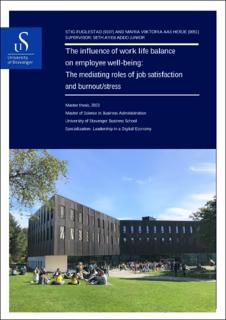| dc.description.abstract | The effect of work-life balance (WLB) on employee well-being had been broadly researched, but within the different dimensions of social, physical, and psychological well-being, a gap existed. Additionally, the relationship between WLB and factors such as job satisfaction and burnout/stress were deemed worthy of more research, especially their mediating role of WLB and employee well-being. WLB was expected to be positively related to the dimensions of well-being and job satisfaction, negatively related to burnout/stress, and assumed that these factors would mediate WLB’s effect on the three dimensions of employee well-being. The data used came from the 2021 European Working Conditions Telephone Survey (EWCTS). To test the hypotheses, a cross-sectional design was employed, using data from a large representative sample of 1096 Norwegian workers. Findings from the confirmatory factor analysis and the structural equation modelling confirmed the hypotheses: WLB was positively related to social well-being and physical well-being. Further, the hypotheses WLB positively relates to job satisfaction and WLB negatively relates to burnout/stress was also confirmed through the analyses. Findings about job satisfactions’ positive relation to the three dimensions of employee well-being, and the negative relation between burnout/stress and psychological well-being was in line with the hypotheses. WLB and psychological well-being, burnout/stress and social and physical well-being were the hypotheses that did not reveal the expected outcome. Moreover, job satisfaction was found to play a mediating role for WLB and the three dimensions of well-being, and burnout/stress was found to have a mediating role for WLB and psychological well-being, but not for social and physical well-being. We recommend practical implementation of support and direction provided by supervisors and managers, which play an important role in improving WLB and employee well-being, lowering burnout/stress and improving job satisfaction. Lastly, we recommend future studies to investigate the relations of our study in a wider population, where not only focusing on the Norwegian participant’s answers. | |
